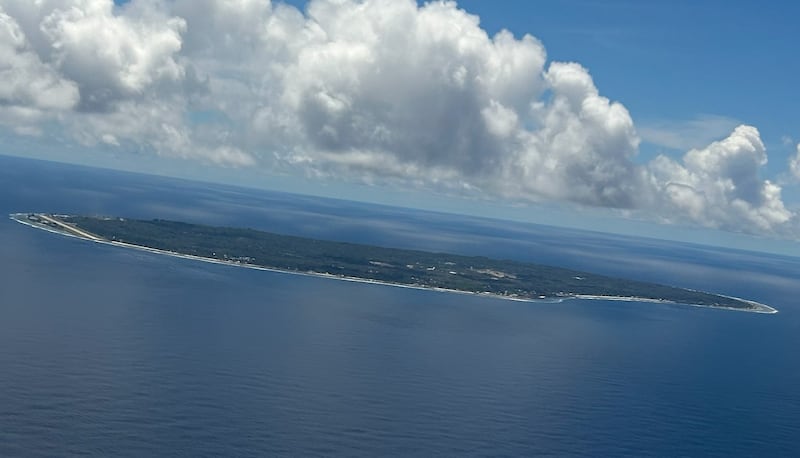UPDATED on January 16, 2024 at 2:31 p.m. ET.
Nauru will switch its diplomatic recognition to Beijing from Taiwan, the government of the Pacific island country of 10,000 people said Monday, reducing Taiwan’s diplomatic allies to just a dozen nations.
The announcement by Nauru’s president David Adeang follows Taiwan’s election on the weekend in which Lai Ching-te from the ruling Democratic Progressive Party emerged as president-elect, beating Beijing-favored Hou Yu-ih of the Kuomintang and Ko Wen-je of the Taiwan People's Party.
“The Republic of Nauru will no longer recognise the Republic of China [Taiwan] as a separate country but rather as an inalienable part of China’s territory, and will sever diplomatic relations with Taiwan as of this day,” a Nauruan government statement said. Nauru will seek full diplomatic relations with China, it said.
China’s government has courted Pacific island nations for the past two decades as it seeks to isolate Taiwan diplomatically and gain allies in international institutions. Beijing regards Taiwan, a democracy and globally important tech manufacturing center, as a renegade province that must be reunited with the mainland.
Taiwan’s Ministry of Foreign Affairs said Nauru’s government had demanded “huge” amounts of economic assistance from Taiwan following Adeang’s election in October.
“China has been actively contacting Nauru’s political figures for a long time and used economic assistance to induce the country’s diplomatic change,” it said in a statement.
“This is a retaliation against democratic values and a blatant challenge to the international order,” the statement said.
A statement from China’s foreign ministry welcomed Nauru’s decision and said it showed the trend of global opinion in favor of the One China principle. China is ready to open a new chapter of relations with Nauru, it said.
The Pacific island nations of Solomon Islands and Kiribati severed ties with Taiwan in 2019 and the central American country of Honduras ended diplomatic relations with Taiwan last year.
The Solomon Islands, in particular, has benefited from diplomatic relations with Beijing. China largely bankrolled the 24-nation Pacific Games that were held in the Solomon Islands capital Honiara in November and has significantly increased other aid to the country.
Nauru’s decision, announced by Adeang in a live streamed speech, means only 12 nations including the Holy See recognize Taiwan instead of China.
In Washington on Monday, the U.S. State Department issued a statement about the decision by Nauru.
“While the Government of Nauru’s action on January 15 to sever its diplomatic relationship with Taiwan is a sovereign decision, it is nonetheless a disappointing one,” it said.
“Taiwan is a reliable, likeminded, and democratic partner. The PRC often makes promises in exchange for diplomatic relations that ultimately remain unfulfilled. We encourage all countries to expand engagement with Taiwan and to continue to support democracy, good governance, transparency, and adherence to the rule of law.”
The U.S., like Nauru, transferred diplomatic recognition from Taipei to Beijing in 1979, though it maintains unofficial ties with the democratic island.
Washington however adheres to its one China policy, which is separate from Beijing's one China principle in that it acknowledges Beijing's claim to Taiwan, but takes no official position on the matter.

In the Pacific, Taiwan’s remaining allies are the Marshall Islands and Palau–both allied to the United States–and Tuvalu, which is seeking more than $1.0 billion in climate-adaptation funding from the international community for land reclamation that would double the size of its most populated island.
The Nauruan government’s statement said its recognition of the One China principle is in the best interests of Nauru’s people.
“Our government remains focused on moving Nauru forward and this policy change is a significant first step in moving forward with Nauru’s development,” it said.
Nauru, northeast of Australia, is the world’s third smallest state after the Vatican and Monaco with an area of 21 square kilometers. More than half of its government revenue comes from hosting Australia’s offshore migrant detention center.
Its sole island is pockmarked by a phosphate mining industry that on paper made Nauru among the world’s richest nations in the second half of last century.
The phosphate is now exhausted and Nauru turned to problematic money-making schemes such as selling passports and offshore banking that earned it international notoriety in the 1990s and 2000s.
BenarNews is an RFA-affiliated online news organization.
Update adds statment from U.S. Department of State and background on U.S.-Taiwan relations.
